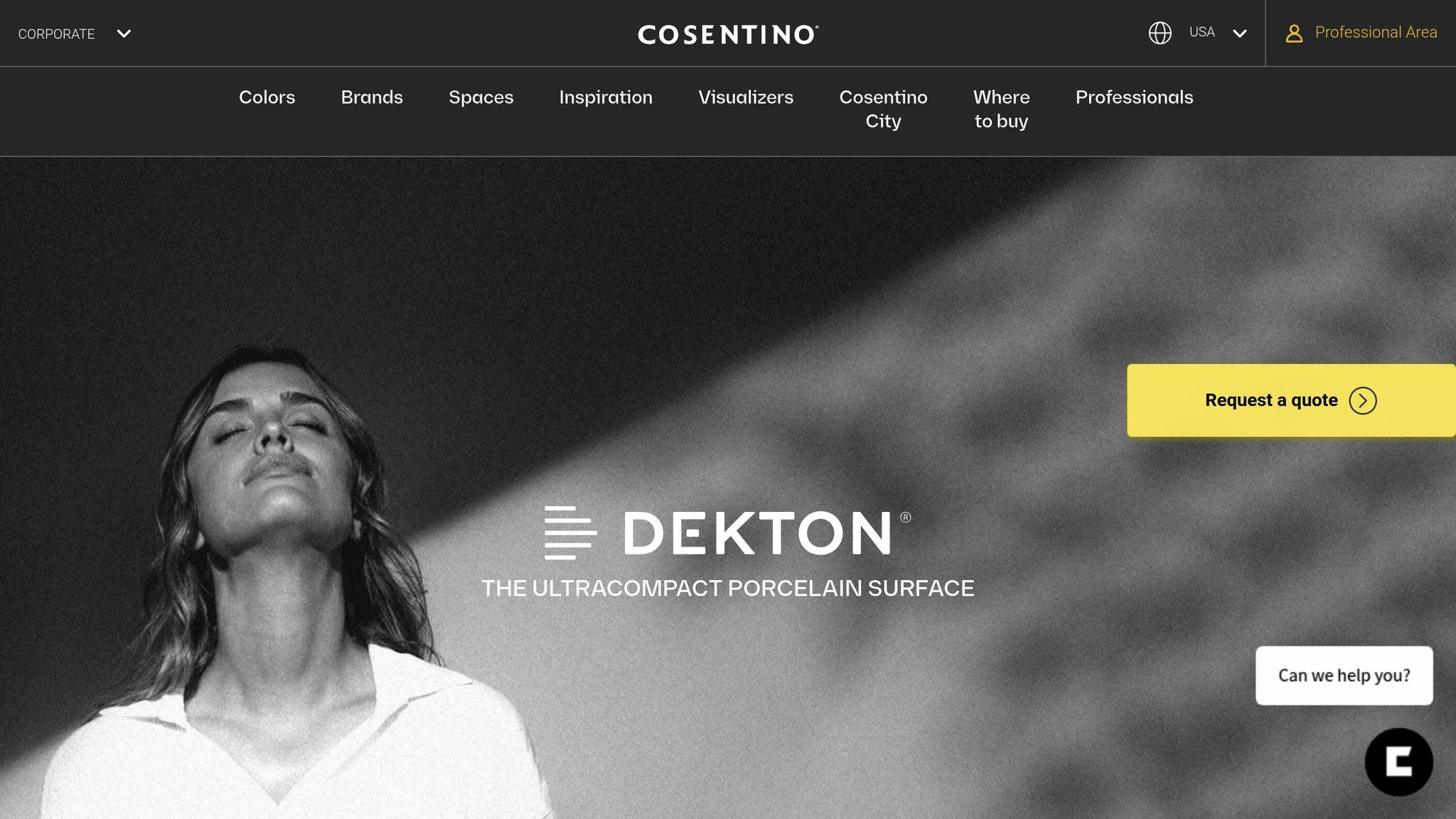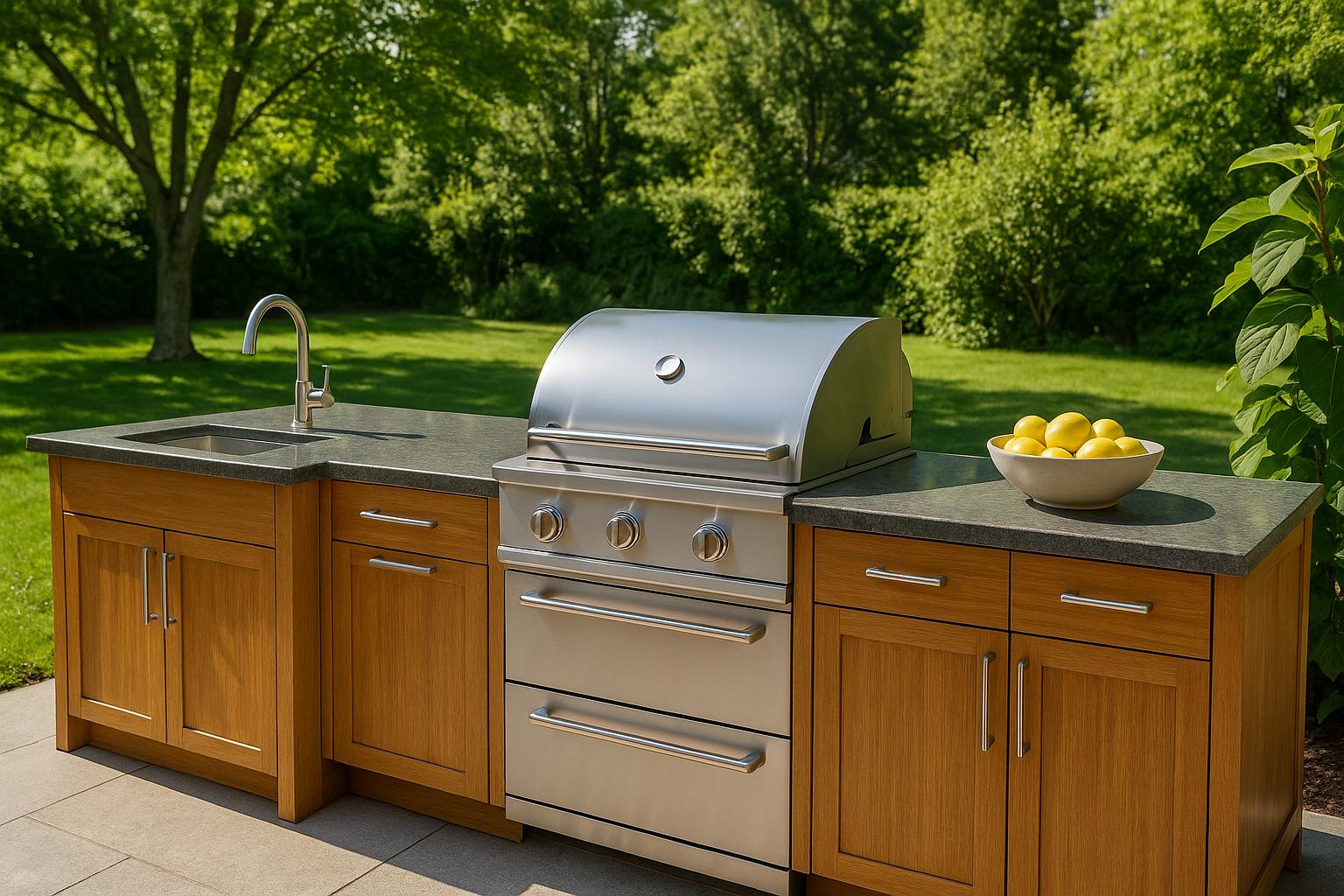- bhavya gada
- No Comments
Maryland’s humid climate makes mold a constant challenge for outdoor kitchens. Choosing the right materials can prevent mold, reduce maintenance, and protect your investment. Here’s a quick guide to five mold-resistant materials perfect for outdoor kitchens:
- Marine Grade Composite Panels: Waterproof and lightweight, these panels resist mold, warping, and UV damage.
- Soapstone: Naturally non-porous, it resists mold and bacteria while handling extreme weather.
- Granite (Properly Sealed): Durable and weather-resistant when maintained with regular sealing.
- Dekton & Porcelain: Non-porous, scratch-resistant, and built to withstand Maryland’s freeze-thaw cycles.
- Composite Decking: A mix of wood fibers and plastic, it resists moisture and mold with minimal upkeep.
Quick Tip: Mold-resistant materials not only fight mold but also reduce long-term costs and maintenance. Keep surfaces clean and ensure proper drainage for the best results.
Below, you’ll find detailed insights into each material, their benefits, and maintenance tips to help you make the best choice for your outdoor kitchen.
Pro-Fit Outdoor Kitchens | DIY Grill Island Design and Assembly
1. Marine Grade Composite Panels
Marine grade composite panels, crafted from materials like HDPE, fiberglass, and closed-cell polyurethane foam, are designed to handle Maryland’s humid and moisture-prone climate effectively [1][3].
Mold Resistance
Thanks to their waterproof construction, these panels prevent water infiltration, unlike traditional wood [1][3][4]. The fiberglass exterior is mold-resistant, as it doesn’t attract mold spores. Plus, the non-porous surface stops moisture buildup, which mold relies on to grow.
Maintenance Requirements
Keeping these panels clean is simple. Regular washing with soap and water, along with promptly removing standing water, helps prevent mold formation. Unlike wood, these panels don’t require frequent sealing or special treatments [1][5][6].
Durability
Marine grade composite panels combine strength with a lightweight design. Products like Coosa Nautical 15 and King Starlite are 30–61% lighter than traditional materials while offering excellent strength, impact resistance, and scratch resistance [2][3][7].
Suitability for Outdoor Use
Outdoor kitchens in Maryland face unique challenges, including high humidity, salt air, and freeze-thaw cycles. Marine grade composite panels are built to handle these conditions, resisting UV fading, moisture absorption, and structural warping [7]. UV stabilization ensures the panels retain their color over time, while the zero moisture absorption prevents issues like warping, rotting, swelling, or cracking. This durability means your outdoor kitchen will stay functional and visually appealing year after year.
Pricing Considerations
These panels are an affordable option for outdoor kitchens. For example, a Composite Marine Board measuring 48″ x 96″ with a 0.25″ thickness costs about $262.92. HDPE marine sheeting, depending on thickness, ranges from $137.04 to $548.17 [1][4]. When you factor in the long-term savings on maintenance and their durability, marine grade composite panels offer excellent value for mold-resistant outdoor kitchen construction.
Next, let’s take a look at another mold-resistant option that works well for outdoor kitchens.
2. Soapstone
Soapstone is a natural choice for outdoor kitchens in Maryland, thanks to its mold-resistant properties and ability to handle the state’s humid conditions. As a low-maintenance material, it stands out as a durable and practical option for countertops in environments prone to moisture.
Mold Resistance
One of soapstone’s standout features is its non-porous surface, which makes it highly resistant to mold. Unlike other natural stones, it doesn’t absorb water, leaving mold spores with little chance to grow [8][9]. Its natural composition also keeps bacteria and mildew at bay without requiring special treatments or sealants.
"Soapstone has its own natural sealer built into the material itself, so it’s always ‘sealed’"
– Jeff Hirsh, owner of Remodel 360 LLC [11]
Maintenance Requirements
Caring for soapstone is refreshingly simple. A quick clean with mild soap and water is all it takes to keep it looking great. For added shine and enhanced resistance to stains, you can apply mineral oil or Dorado Dry Wax [10]. While soapstone is softer than granite and may scratch more easily, any marks can be sanded out and re-oiled, restoring the surface to its original state. However, avoid using harsh abrasive cleaners, as they might harm the finish.
Durability
Soapstone isn’t just about looks – it’s built to last. With proper care, soapstone countertops can endure for 50 years or more, and there are even historical examples, like 19th-century sinks and stoves, that are still in use today.
"Soapstone is an incredibly durable countertop material that can last for more than 100 years with regular care and maintenance"
– Jeff Hirsh, owner of Remodel 360 LLC [11]
Although it’s softer than granite and prone to scratches, the ability to easily repair those scratches adds to its longevity and makes it a practical choice for outdoor use.
Suitability for Outdoor Use
Maryland’s unpredictable weather, from humid summers to freezing winters, can be tough on outdoor materials, but soapstone handles it all with ease. It doesn’t crack or expand with temperature changes, making it perfect for freeze-thaw cycles. Plus, its heat resistance means it won’t fade or warp under direct sunlight.
"Using soapstone for outdoor kitchens is ideal because it’s heat-resistant, meaning there’s no need to worry about placing hot cooking utensils on it. In addition, its non-porous nature ensures it’s properly sealed and can handle all spills."
– Bucks County Soapstone Company Inc. [13]
Soapstone’s resistance to moisture makes it a great choice for rainy or humid environments, and unlike granite or quartz, it doesn’t require additional treatments to maintain its properties. For extra protection during Maryland’s harsh winters, covering your soapstone surfaces when not in use is a smart precaution. These qualities ensure that soapstone not only weathers Maryland’s climate but also keeps your outdoor kitchen looking and functioning beautifully for years to come.
3. Granite (Properly Sealed)
Granite stands out as one of the toughest natural stones, making it a fantastic option for outdoor kitchens that need to handle Maryland’s unpredictable weather. Its resistance to mold relies heavily on using a high-quality sealant that protects against heat, water, and chemicals while preventing moisture absorption. A quick water test – where water beads up on the surface – can confirm whether the seal is still effective[14][16][17]. Because proper sealing is so critical, understanding how to maintain granite is key to ensuring its durability.
Maintenance Requirements
Taking care of granite properly not only keeps it looking great but also strengthens its mold-resistant properties. It’s recommended to reseal granite every 1–2 years with a breathable, penetrating sealer specifically designed for outdoor use[15]. Stay away from cheap sealers or those containing silicone or linseed oil, as these can do more harm than good[14]. For regular cleaning, stick to mild soap and water to maintain the stone’s natural shine[14][20]. Maryland’s harsh weather can challenge even the best sealers, so using cutting boards, trivets, and coasters adds an extra layer of protection[20].
Durability
Granite’s natural hardness makes it highly resistant to scratches, chips, and heat, which is why it performs so well outdoors[18][19][12]. Its strength allows it to endure extreme temperatures, whether it’s freezing cold, scorching heat, or heavy rain[18]. These qualities make granite a reliable choice for Maryland’s unpredictable climate.
"Granite is an excellent choice for outdoor countertops due to its natural durability and resistance to weather conditions."
– Granite Countertop Warehouse [18]
Suitability for Outdoor Use
When properly cared for, granite thrives in outdoor settings. It can handle Maryland’s freeze-thaw cycles, intense sunlight, and heavy rains without cracking, warping, or fading[18][19][20]. Lighter-colored granites, in particular, offer strong resistance to UV damage[12]. Plus, granite’s variety of colors and patterns allows it to seamlessly fit into any outdoor kitchen design while complementing the surrounding landscape[20].
"Yes, an outdoor granite countertop may require more frequent sealing, but it withstands freezing temperatures, prolonged direct sun, and rain, quite beautifully."
– MSI Surfaces [19]
For added winter protection, cover your granite countertops with a heavy-duty, waterproof cover when not in use. If snow accumulates, gently remove it with a soft broom or cloth[17]. Resealing at least once a year – or more often in harsher conditions – will help maintain its durability over time[20]. Compared to materials like quartz, marble, and laminate, granite offers superior weather resistance and durability[22]. While it does require more maintenance than soapstone due to the need for resealing[12], granite provides a broader range of colors and patterns to suit your style[21].
sbb-itb-843f8be
4. Dekton and Porcelain Surfaces

Dekton, crafted using Sinterized Particle Technology, and high-fired porcelain are impressive options for outdoor kitchens. These non-porous surfaces are designed to handle the elements while offering durability and style [24][25]. Porcelain, a ceramic material fired at high temperatures, is particularly known for its strength and resistance to heat and stains [24].
Mold Resistance
Both Dekton and porcelain are exceptionally resistant to mold, thanks to their non-porous nature [23][26]. Unlike natural stone, which can absorb moisture through tiny pores, these engineered surfaces block water entirely, leaving no room for bacteria or mold to grow. This feature is especially helpful during Maryland’s humid summers when moisture levels are high. A quick cleaning routine is all it takes to keep these surfaces hygienic and mold-free [24].
Maintenance Requirements
Keeping these surfaces clean is straightforward. Use warm water and a soft cloth for regular cleaning, steering clear of abrasive or acid-based cleaners [27][28]. Spills, especially from wine or coffee, should be wiped up promptly with a mild cleaner, followed by drying the surface to prevent watermarks [28]. For stubborn stains, rinse thoroughly with water and dry with kitchen roll. If needed, a limescale remover and a blue scouring pad can be used in gentle circular motions [27]. Multipurpose disinfectants like Sanytol or Lysol work well when diluted, but avoid leaving undiluted products on the surface for more than five minutes [27]. If these materials are used as flooring or wall coverings, cleaning the joints regularly will help maintain their appearance [28]. These simple care routines complement the durability of these surfaces, making maintenance a breeze.
Durability
Durability is a standout feature of both Dekton and porcelain. Dekton handles extreme temperatures without cracking or warping, making it a great fit for Maryland’s unpredictable weather [30]. Its UV resistance ensures it won’t fade or discolor, even after years of sun exposure [30]. Porcelain countertops are equally tough, standing up to heavy use and harsh outdoor conditions without showing wear [32]. Both materials are highly scratch-resistant, making them ideal for the demands of a busy outdoor kitchen [30][31]. Additionally, Dekton is a carbon-neutral surface, adding an eco-conscious element to its list of benefits [29].
Suitability for Outdoor Use
When it comes to outdoor kitchens, Dekton and porcelain outperform many traditional materials. Dekton’s UV resistance ensures long-lasting color and appearance, while its ability to endure extreme temperature changes makes it perfect for Maryland’s freeze-thaw cycles [29].
"Dekton offers an unparalleled combination of beauty, durability, and low maintenance for outdoor kitchen countertops. Its resistance to the elements, heat, and stains, along with its aesthetic versatility, makes it a superior choice for outdoor spaces." – Select Surfaces [31]
Porcelain countertops are also becoming a favorite for outdoor kitchen designs due to their durability and stylish options [32]. Both materials come in a wide range of designs and colors, allowing homeowners to achieve their preferred look without sacrificing performance [31][32][33]. For outdoor kitchens in Maryland, these surfaces require minimal upkeep – just soap, water, or a mild cleaner [29]. Their mold resistance and durability provide peace of mind, ensuring a long-lasting and functional space.
For Maryland homeowners planning an outdoor kitchen, Pro Landscapes MD can help integrate these advanced, mold-resistant surfaces into a design that’s both practical and visually appealing.
5. Composite Decking
Composite decking has become a go-to option for outdoor kitchens, combining the natural charm of wood with improved durability and resistance to mold. Crafted from a mix of wood fibers and recycled plastic, this material is built to handle Maryland’s humid climate while providing a reliable base for outdoor cooking spaces.
Mold Resistance
One of the standout features of composite decking is its ability to resist mold better than traditional wood. This is largely due to its engineered composition and surface design. Capped composite decking, in particular, offers an extra layer of protection against moisture, making it even more mold-resistant than its uncapped counterpart [37].
However, mold can still appear if debris like dirt and pollen accumulates, creating a biofilm that encourages growth [34]. The good news? Composite decking absorbs far less moisture than wood, meaning spills and water tend to stay on the surface, making cleanup much easier [38].
Maintenance Requirements
Keeping composite decking in great shape is straightforward. The key is to prevent debris buildup and ensure proper drainage. A basic routine of sweeping, rinsing, and occasionally deep-cleaning with a soft-bristle brush and mild soap – especially during high-pollen seasons like spring and fall – goes a long way [35].
Proper drainage is equally important. Clearing gaps between boards prevents water from pooling, and redirecting downspouts away from the deck helps reduce moisture retention [35][36]. For spills, it’s best to act quickly, using manufacturer-approved cleaning solutions and rinsing thoroughly to avoid mold or mildew formation [36]. These simple steps help maintain the deck’s appearance and performance over time.
Durability
With regular care, composite decking outlasts traditional wood by a significant margin. While a wood deck typically lasts 10–15 years, composite decking can endure for 25–30 years, saving homeowners around $2,300 in maintenance costs over a decade [38].
Designed to handle heavy foot traffic and shifting weather conditions, composite decking resists scratches, making it ideal for areas with frequently moved furniture or cooking equipment [39]. It’s also built to withstand Maryland’s temperature swings without warping, cracking, or splintering – an important safety feature for outdoor kitchens.
Suitability for Outdoor Use
Composite decking checks all the boxes for outdoor kitchens. It’s less flammable than wood, which is a big plus for spaces with grills or fire features [38]. Its low absorbency makes cleaning up spills and stains a breeze [38]. Additionally, the surface is designed to be low-slip, offering extra safety in areas where moisture or spills are common [40].
To get the most out of your deck, consider using a grill mat in cooking areas, keeping a fire extinguisher close by, and placing protective pads under furniture legs when moving heavy items [38][39]. Adding outdoor rugs in high-traffic zones can also help preserve the deck’s surface. Like other mold-resistant materials, composite decking supports the vision of a durable, low-maintenance outdoor kitchen.
Pro Landscapes MD specializes in helping Maryland homeowners incorporate composite decking into their outdoor kitchen designs. With proper installation, including the right spacing and drainage, your deck can deliver long-lasting performance and style.
Material Comparison Chart
When designing your outdoor kitchen, picking the right material means weighing factors like durability, maintenance, and mold resistance. Below is a comparison chart that breaks down five mold-resistant materials, helping you make an informed choice suitable for Maryland’s humid climate and fluctuating temperatures.
| Material | Mold Resistance | Maintenance Requirements | Durability | Outdoor Suitability | Warranty Coverage |
|---|---|---|---|---|---|
| Marine Grade Composite Panels | Excellent – engineered to resist moisture absorption | Low – occasional cleaning with mild soap | High durability | Excellent – ideal for moisture-rich areas | Manufacturer-backed warranty (varies) |
| Soapstone | Excellent – naturally non-porous when maintained | Moderate – periodic oiling and sealing needed | Exceptional durability | Good – performs well outdoors | Varies by supplier |
| Granite (Properly Sealed) | Good – depends on sealing and regular upkeep | Moderate – annual resealing recommended | Reliable with care | Good – durable with consistent maintenance | Warranty depends on installation quality |
| Dekton & Porcelain Surfaces | Excellent – non-porous surface minimizes mold growth | Low – soap and water cleaning | High durability | Excellent – built for outdoor use | Warranty coverage varies by brand |
| Composite Decking | Good to Excellent – varies by type and protective capping | Low – regular sweeping and occasional cleaning | Long-lasting durability | Excellent – designed for outdoor conditions | 25–50 years, depending on material type |
This chart highlights key differences between materials. For instance, smooth, engineered surfaces like Dekton and marine-grade composites excel at resisting mold by reducing organic buildup. Dekton’s non-porous nature also prevents liquid and food particle absorption, making it easy to clean and maintain.
For Maryland homeowners, dealing with high humidity and temperature swings is a common challenge. Engineered materials, such as marine-grade composites and composite decking, generally require less upkeep over time. In contrast, natural materials like soapstone and granite can perform exceptionally well but demand consistent maintenance to stay in top condition.
Each material comes with its own set of advantages and trade-offs. This chart provides a clear snapshot of those differences, helping you choose the best option for your outdoor kitchen. Pro Landscapes MD works closely with homeowners to weigh these factors – balancing upfront costs, maintenance preferences, and long-term performance to create outdoor kitchens perfectly suited to Maryland’s climate and lifestyle.
Conclusion
Choosing mold-resistant materials for your outdoor kitchen offers a range of benefits that go beyond just aesthetics. These materials help prevent mold growth, enhance air quality, cut down on expensive repairs, and extend the life of your kitchen components. Plus, they’re perfect for Maryland’s humid and unpredictable weather, requiring little maintenance. Options like marine-grade composites and engineered surfaces eliminate the need for constant painting, sealing, or refinishing, giving you more time to enjoy your outdoor space instead of maintaining it.
These tough, low-maintenance materials create a solid foundation for a stress-free outdoor kitchen. Pro Landscapes MD specializes in designing and building outdoor kitchens with these cutting-edge materials across central Maryland. They bring their expertise to communities in Howard, Montgomery, Carroll, Frederick, Prince George’s, and Baltimore Counties, delivering designs that are both practical and stunning, built to last for years.
For homeowners in Maryland, where humidity and temperature shifts are common, picking the right materials is key to keeping your outdoor kitchen durable and attractive. While mold-resistant materials are a great start, proper ventilation and managing humidity levels are equally important. Routine inspections can also catch small issues early, helping to protect your investment and ensure your outdoor kitchen remains in top shape for the long haul.
FAQs
What maintenance is needed to keep mold-resistant materials in outdoor kitchens looking their best?
To keep your mold-resistant materials in top shape and ensure they last, regular maintenance is essential. Porous materials like stone, concrete, and grout need sealing every 12–18 months. This helps block moisture, which can lead to mold growth. Stainless steel and powder-coated aluminum are relatively easy to care for but should be checked occasionally for rust or surface damage. HDPE polymer requires very little maintenance but benefits from occasional cleaning. As for teak wood, sealing and cleaning are necessary to preserve its natural resistance to mold.
No matter the material, regular cleaning and using protective covers during tough weather conditions can go a long way in extending their durability and keeping your outdoor kitchen looking great for years.
What are the cost considerations for mold-resistant materials in outdoor kitchens, both upfront and long-term?
The price of mold-resistant materials for outdoor kitchens can vary quite a bit based on the type and quality of the material. For instance, budget-friendly options like concrete or tile typically start at around $3 per square foot, while high-end choices such as granite or stainless steel can cost anywhere from $50 to $100 per square foot.
While some materials come with a higher initial price tag, they often deliver long-term benefits by reducing the need for frequent maintenance, repairs, or replacements – especially in humid areas where mold is a common issue. Choosing durable, mold-resistant materials can be a smart investment for building an outdoor kitchen that stands the test of time.
Why is it important to use mold-resistant materials for outdoor kitchens in Maryland?
Maryland’s weather brings warm, humid summers and plenty of rain – ideal conditions for mold to grow. Incorporating mold-resistant materials into your outdoor kitchen is a smart way to safeguard your space. These materials help prevent damage, keep things clean, and extend the life of your outdoor setup. Plus, they make it easier to maintain your kitchen’s appearance, even with Maryland’s tricky weather.


















Chat with Us